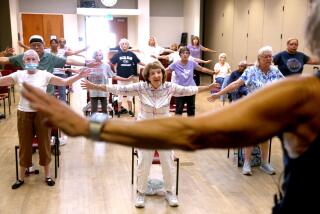Speech Coach Helps Vanquish Voice Handicaps
- Share via
NEW YORK — They sound as if they need help:
Grown women with breathless, little-girl voices and middle-aged men with creaky, old-man voices. The nasal, the hoarse, the monotonous and the too-soft-spoken, mumblers and whisperers, people who say “pahk the caah” or “dis and dat.”
They are lawyers and doctors, accountants and brokers. They all come to Jeffrey Jacobi, a personal voice trainer who transforms vocal weaklings into latter-day Demostheneses.
His credo: With practice and exercise, anyone can build a better voice by developing the vocal resonance that produces a strong, rich and pleasing sound.
Jacobi began his career 10 years ago, working with actors and other performers. Most of his clients now are professionals who have concluded that how they sound can be as important as what they say, whether they’re addressing a room full of people or leaving a telephone message.
Take a corporate executive we’ll call Dale, a 49-year-old Michigan MBA and former Air Force officer with a confident smile and a firm handshake. He is not the sort of man one would expect to worry about his voice.
But in oral presentations to executives of his financial services company--selling ideas, really--Dale realized that he was being undercut by his key sales tool: his voice.
Dale was a good writer, but when addressing more than a few people, he was monotonic. That was when he felt confident. When he was nervous, his voice would rise suddenly. He also swallowed the ends of sentences and sounded Southern. He said “dollahs” instead of “dollars” and he spoke too softly.
“I needed professional help,” he recalled.
Jacobi was sympathetic. “If (Dale’s) career was going to advance, he couldn’t afford to sound like that. When you stumble in those circles, it’s not forgotten.”
Dale’s plight was nothing unusual for Jacobi, whose clients also include:
* A woman psychiatrist whose voice had such low pitch that many callers mistook her for a man.
* A lawyer who believed he was losing courtroom arguments to adversaries with more powerful voices.
* A stockbroker from a working-class family whose “dees” and “dems” threatened to ruin his interview for admission to an exclusive country club.
* A minister whose booming delivery and drawn-out pronunciations in casual conversation made him sound like a frustrated Shakespearean actor, and a holier-than-thou one at that.
Jacobi, 34, is a sort of Upper West Side Henry Higgins. His studio is in a grand, turn-of-the century brick apartment house and has windows overlooking the Hudson River.
Jacobi inherited his practice from his father, who fled Germany in the 1930s and later worked with actors the likes of Tony Randall and E.G. Marshall. Jeffrey’s own speech, for all its precision, conveys sincerity rather than artifice.
He conducts sessions seated at a grand piano, which he uses to explore the client’s vocal range. Then, some exercises: breathing in and out slowly and evenly; humming in a comfortable range to warm up the voice; sustained vowel pronunciations, in which words such as Iowa and lullaby are drawn out, in attempts to open the mouth.
“You want to be relaxed, to feel the vibrations in the upper half of your body,” he tells clients. The vibrations--a buzzing sensation in the nose, lips, throat and chest--make up a resonance that gives power to the voice and authority to what is being said.
He passes along tips: Concentrate on one thought at a time and speak in shorter phrases; sit, don’t slouch, while talking on the telephone, and neigh like a horse, to rev up the voice, before lifting the receiver; if your throat feels congested, swallow--a habit of “clearing” the throat can harm the vocal cords.
“A voice has to be developed. It’s not just ‘Speak up!’ ” Jacobi says. “The voice has to be exercised. It doesn’t happen after one or two lessons.” Clients, who pay $75 per half-hour lesson, typically work with him for three to six months. They are told to repeat their exercises for 10 or 15 minutes each day.
Dale kept at it. Standing in his corner office looking out at the Statue of Liberty, he would practice his breathing, his humming, his vowels. His colleagues could hear him making these strange sounds, but Dale didn’t care.
He began to feel what Jacobi calls “his natural voice”--his natural range and register. He learned to stay within that range, to emphasize points by “punching” certain words, to slow down, to open his mouth.
He felt he was speaking too slowly, but to everyone else it sounded just right. His voice gained resonance; he could feel in his chest the new clarity and richness. Others began to compliment him on the confidence of his presentations.
Dale still practices as he drives to work through the Holland Tunnel each morning, drawing out the vowels in Iowa and Mama .
The strange looks he gets from other motorists matter little to him: “By the time I come out of the other end of the tunnel, I can really hear the difference.”
More to Read
Sign up for Essential California
The most important California stories and recommendations in your inbox every morning.
You may occasionally receive promotional content from the Los Angeles Times.













